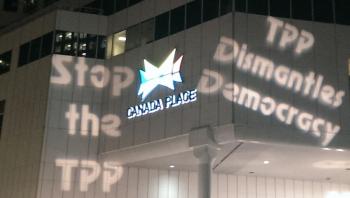The Trans Pacific Partnership (TPP) is yet another corporate empowering deal that is being negotiated behind firmly closed doors, in various countries throughout the world.
Not only is public input not welcome, but even the pretence of public participation has been lifted. Despite the lack of transparency, some documents have been leaked, and the “omissions” revealed speak loudly to the conspiratorial nature of the “partnership.”
Countries currently involved in the U.S–led negotiations include Australia, Brunei, Canada, Chile, Japan, Malaysia, Mexico, New Zealand, Peru, Singapore, and Vietnam.
Equally significant is that 600 industry lobbyists and “advisors,” as well as unelected trade representatives, are at the table, while representatives from the public at large and businesses other than huge monopolies, are conspicuously absent.
The significance of this distorted representation necessarily means that those who are represented are empowered, while those who are absent, are disempowered.
Corporate monopolies such as Monsanto and Walmart are well-represented at the table. The track record of such corporations, over the last thirty years or so, shows that they are devoted to a de-humanizing economic theory known as neoliberalism, which erodes the middle class, creates huge income disparities in the population, and strangles both democracy and the economy, by handcuffing economic, social, and political self-determination. Significantly, polls show that the majority of Canadians do not support the consequences of these economic policies.
What does neoliberalism look like on the ground?
It means that transnational companies such as Monsanto increase their legislative reach so that the agri-business flourishes not only to the detriment of small and medium-sized farms, but also to the detriment of public health. For example, local, sustainable, biologically diverse farming practices produce healthy foods, while Monsanto’s Genetically Modified Organisms (GMO’s) with their ubiquitous patent protections, have yet to be proven entirely safe for human consumption.
Pharmaceutical monopolies also gain under corporate empowerment deals, by securing extended patents, and higher prices for their products. Unfortunately, higher prices and extended patent protections negatively impact not only the health and safety of the population, but also the economy. A universal Pharmacare program, on the other hand, would not only reduce the cost of medications — and create savings of about $10. 7 billion per year — but lower–priced medications would also improve access to life-saving drugs, and save the lives of those with life-threatening diseases who couldn’t otherwise afford them, (or the insurance offered by Big Insurance — another conglomerate at the negotiating table).
The surveillance state also thrives and grows thanks to these corporate empowerment “partnerships.” Surveillance Inc is lobbying to have service providers collect and hand over data without warrants and/or normal privacy safeguards. Such corporate/state intrusions into privacy impact freedom of expression and have a “silencing” effect on people. It means, for example, that anyone, at anytime, can potentially be blackmailed to serve the needs of corrupt entities.
The list of corporate polities that benefit from these exclusive negotiating partnerships (to the detriment of the public) is long, but among the most important of the negative impacts is the toll exacted on democracy, and on the ability of the government to protect its people. Since corporate empowerment deals give corporations rights that supercede existing laws and regulations, train safety, plane safety, food safety, water safety, the environment– the safety of the population as a whole — is further imperilled. Furthermore, the power imbalance that is created, with the metaphorical 1% garnering disproportionate income and power over the 99%, means that the corporate governance model resembles a plutocracy more than it resembles a democracy.
These are all very real dangers that are impacting Canada, and much of the world, by stealth. Several important questions need to be answered. If the “partnership” is a net benefit to the public, then what else is being hidden, and why?
Mark Taliano is a writer, activist and retired teacher.



